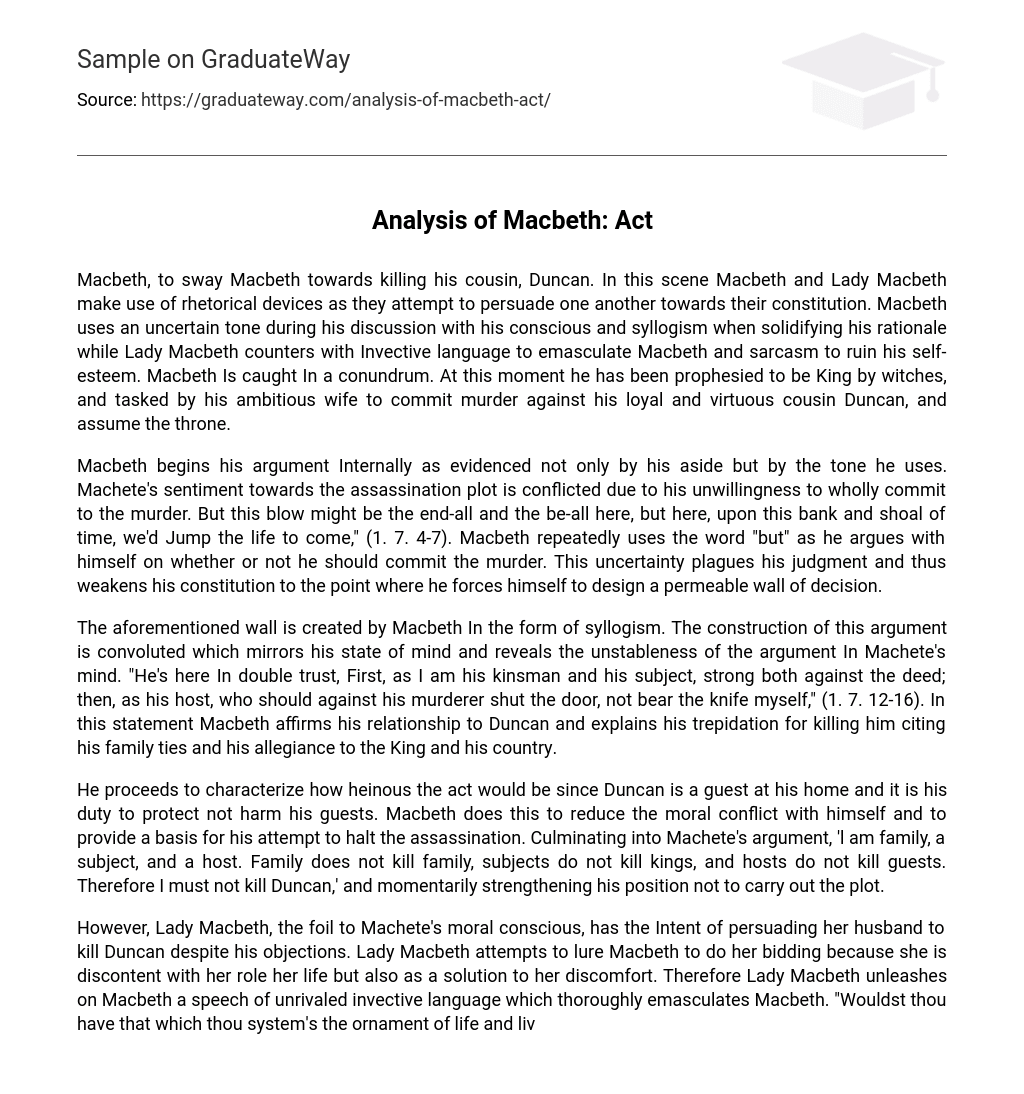Macbeth and Lady Macbeth employ various rhetorical devices to convince one another to carry out their plans. Macbeth utilizes an unsure tone and uses syllogism to justify his actions. Meanwhile, Lady Macbeth employs invective language to belittle Macbeth and sarcasm to demoralize him. Macbeth finds himself in a dilemma as he is both destined to be king according to the witches and pressured by his ambitious wife to kill his faithful cousin Duncan and take the throne.
Macbeth’s internal struggle is evident in both his aside and his tone. He is conflicted about the assassination plot and not fully committed to the murder. However, he considers the potential consequences, saying, “But this blow might be the end-all and the be-all here, but here, upon this bank and shoal of time, we’d Jump the life to come,” (1. 7. 4-7). Throughout his argument with himself, Macbeth repeatedly uses the word “but”, revealing his uncertainty. This lack of certainty affects his judgment and weakens his resolve to the point where he must construct a flexible decision-making framework.
The wall mentioned above is constructed by Macbeth using a syllogism. The complexity of this argument reflects his mental state and exposes the instability of Macbeth’s mind. “He’s here in double trust, first, as I am his kinsman and his subject, strong both against the deed; then, as his host, who should against his murderer shut the door, not bear the knife myself,” (1. 7. 12-16). In this statement, Macbeth confirms his relationship with Duncan and justifies his hesitation to kill him by referring to his family ties and loyalty to the King and his country.
Throughout his speech, Macbeth emphasizes the enormity of the act he contemplates. He highlights the fact that Duncan is currently a guest in his home, and as the host, it is his duty to protect and not cause harm to his guests. Macbeth employs this reasoning to alleviate any moral conflict within himself and provide a justification for his decision to prevent the assassination. In essence, Macbeth solidifies his argument by stating, ‘I am family, a subject, and a host. It goes against all principles for family to kill family, subjects to kill kings, and hosts to kill guests. Thus, I cannot carry out the plan to kill Duncan.’ By reinforcing these points, Macbeth momentarily strengthens his resolve to abstain from the nefarious plot.
However, Lady Macbeth serves as a contrasting force to Machete’s moral conscience and is determined to convince her husband to kill Duncan, despite his objections. Lady Macbeth’s motivation stems from her dissatisfaction with her own role in life and sees manipulating Macbeth as a solution to her discontent. Thus, Lady Macbeth delivers a speech filled with harsh words that deeply emasculates Macbeth. She questions, “Wouldst thou have that which thou esteem’st the ornament of life and live coward in thine own esteem, like the poor cat i’ the adage?” (1.7.45-49). In this passage, Lady Macbeth challenges Macbeth directly, demanding that he either honor his word or forever be seen as a coward. She further humiliates him by using a cat analogy, which can imply possessing feminine traits. Despite being a respected and powerful warrior, Macbeth’s pride is severely diminished by his wife’s words, leading him to make a decision that goes against his previous principles.
Lady Macbeth intensifies her efforts to manipulate her husband, pushing him to suppress his morals. Her use of sarcasm, although harsh for a vulnerable Macbeth, is crucial in solidifying her control over him. Lady Macbeth believes that Macbeth’s indecisiveness makes him less of a man. She argues that circumstances don’t dictate one’s actions; rather, individuals shape their own destiny. By asserting her dominance, she undermines Macbeth’s self-worth and questions his ability to act.
Lady Macbeth mocks her husband for his wavering determination and sudden reluctance to carry out the deed. She acknowledges how eager he was at an inappropriate time and how weak he is when the conditions are perfect for such an act. Despite Macbeth’s conflicting thoughts and lack of self-confidence and strength, he accepts her harsh words without challenging her. This surrender and submission demonstrate Lady Macbeth’s triumph in persuading Macbeth to kill Duncan. In this scene, Macbeth tries to retract his previous desire to murder Duncan by constructing logical arguments, primarily using syllogism.





